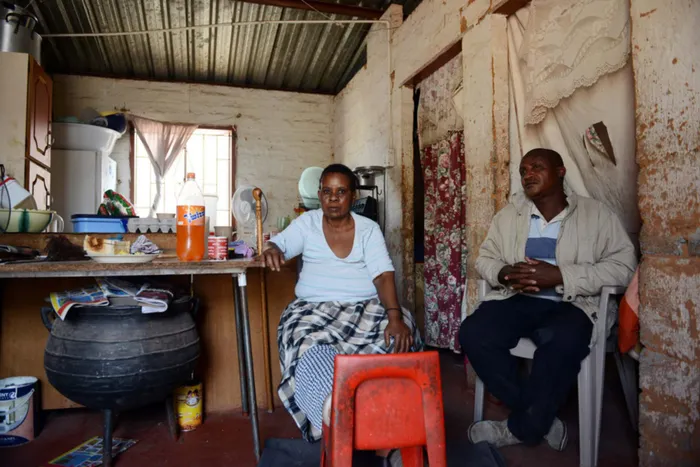The poor are their own liberators

Stophel Khombo, a worker at Anglo Platinum, discusses his problems and failure to afford medical treatment for his wife Kenosi Khombo who has a severe medical condition in her legs. Picture: Phill Magakoe Stophel Khombo, a worker at Anglo Platinum, discusses his problems and failure to afford medical treatment for his wife Kenosi Khombo who has a severe medical condition in her legs. Picture: Phill Magakoe
we blacks have for long feigned life in a classless society. As a result, we never examine the impact of class in the fragmentation of unity.
We have never been a homogeneous group, hence the difference in how we see things. The black rich and poor have always been among us. South Africa is the most unequal society and the widest gap is in the black community.
It is easier to talk about inequality between blacks and whites than admit there is a big class difference among us.
We can no longer ignore class in the wake of the Marikana tragedy.
In the early years of the ANC the agenda of the liberation movement was set by the black bourgeoisie. But this does not mean that they were indifferent to the plight of the poor working class and unemployed.
Since the unbanning of the ANC, the values shaping former liberation heroes have become bourgeoisie, integrating into the supremacist capitalist structure.
Even though the constitution called for economic justice and social equality, former president Thabo Mbeki placed emphasis on gaining access to resources to create a black middle class or bourgeoisie. It is this desire to become part of the elite or bourgeoisie that has seen not just the former liberation movement, but its leaders and government officials, disconnect from their grassroots.
The desire for upward mobility – which included moving out of the townships, sending kids to multiracial schools, speaking English and only visiting disadvantaged communities to display how some individuals have “made it” – has recreated the class difference that has always existed among blacks.
The aftermath of the Marikana massacre has regenerated heated discussions about how leaders who benefit from capitalist interests have forgotten their responsibility to the poor working class, unemployed and marginalised.
The role played by the poor – miners, for instance – who live in shacklands, in highlighting economic inequality that threatens social cohesion has not received public approval because they are not of the “acceptable class”.
The miners are deemed as illiterate, inarticulate, and violent. They are a threat to the interests of the bourgeoisie.
On the other hand, Lonmin executives and shareholders are acceptable because they speak the language of a “peace accord”, and are intelligible and accommodating. It does not take a rocket scientist to recognise the courage of the mineworkers during the struggle for economic justice and social equality.
These lower-class workers are a living symbol of the continuing struggle to make South Africa ideal for all who live in it. Without economic justice there can be no peace in this country.
It is only when this struggle is under the control of lawyers, pastors, university-trained government officials, executives and other articulate individuals that it becomes acceptable.
This is an example of how class has become a determinant of who owns and sets the agenda for the struggle.
A powerful but forgotten aspect of the worker struggle was led by a young black lawyer named Cyril Ramaphosa in the 1980s. He was perceived as not only intelligent but intelligible because he was a reasonable and accommodating man.
Almost 30 years later, the black bourgeoisie have conveniently forgotten that an important dimension of this struggle has always been a profound critique of the capitalist system.
It was understood in the 1980s – leading up to the formation of the United Democratic Front – that the prevailing economic and social order did not promote justice and equality.
Now that many of the leaders of the struggle have become bourgeoisie and part of the system they fought against – Ramaphosa, for instance, is a shareholder in Lonmin – the critique of selfishness, greed and individualism of capitalism is virtually absent in the discourse on Marikana.
Even those leaders who appreciate the threat posed by economic inequality and injustice to social cohesion do not condemn capitalist greed.
We need to talk about the plight of the working poor, unemployed and marginalised in Marikana and their right to conduct their struggle in a way they deem fit. None but the poor will liberate themselves.
Leaders must provide a vision for social and economic change that addresses the conditions under which the poor working class live in Marikana and other flashpoints of the country.
At the social cohesion summit in Kliptown, delegates made it clear that economic inequality and the monopolisation of the wealth by a few led to poverty.
They called upon government, business, labour and stakeholders to work towards closing the gap between the poor and rich.
For unity in diversity, we have to acknowledge the class differences. The poor have every right to express their unhappiness with inequality.
It is time that they were listened to.
l Sandile Memela is chief director of social cohesion in the Department of Arts and Culture, and writes in his personal capacity.